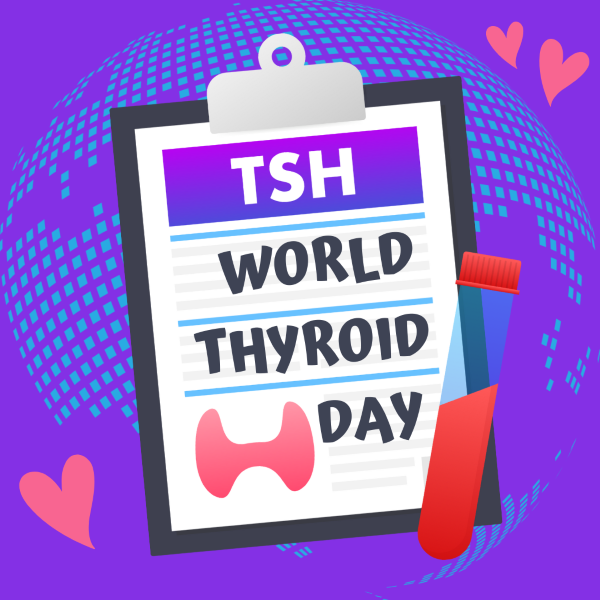It is a small, butterfly-shaped gland located underneath your Adam’s apple that weighs only 20 grams—Yet, it has a significant impact on the body and many of its functions including metabolism, body weight, body temperature, breathing, heart rate, skin, hair, nails, the menstrual cycle, mental state, and more.
This small but powerful gland is none other than the thyroid.
With an estimated 1 in 20 people suffering from thyroid disease in the UK alone, it is important to understand the purpose of your thyroid, how it regulates your body, and signs to look out for when it’s not working properly.
This year on World Thyroid Day, take some time to understand and appreciate the importance of the thyroid gland on the overall health of your body.
5 Things Everyone Should Know About Their Thyroids
1. The Thyroid’s function is measured by TSH, T3, and T4.
In order to determine whether your thyroid is functioning as it should, doctors will draw blood to test the levels of your TSH (thyroid-stimulating hormone).
TSH is produced by the pituitary gland with the purpose of regulating the function of your thyroid.
This means that TSH controls the release of thyroid hormones into your blood, determining whether your thyroid is underactive and needs to be stimulated more, is normal, or is overactive and needs to be stimulated less.
For example, if your thyroid is underactive and not producing enough thyroid hormones, your TSH levels will be high because your pituitary gland will be attempting to stimulate your thyroid more.
However, if your thyroid is overactive and producing too many thyroid hormones, your TSH levels will be low because your pituitary gland is attempting to stifle the overstimulation of your thyroid.
For this reason, TSH is the best indicator of whether your thyroid is functioning properly.
However, if your TSH is not in the normal range, doctors will also test your T3 and T4 levels, which are the two main thyroid hormones.
Generally, if your TSH is too high, it indicates that your T3 and T4 levels are low, and if your TSH is too low, it indicates that your T3 and T4 levels are too high.
2. The thyroid can be under or overactive.
The thyroid is considered disordered when it produces too much or too little TSH.
Hyperthyroidism is when your thyroid is overactive, while hypothyroidism is when your thyroid is underactive.
Due to how many bodily functions the thyroid affects, when your thyroid is not producing the proper amount of hormones, you can experience symptoms that drastically interfere with your daily life.
Symptoms Associated with Hyperthyroidism, according to the NHS.
- nervousness, anxiety and irritability
- mood swings
- difficulty sleeping
- persistent tiredness and weakness
- sensitivity to heat
- swelling in your neck from an enlarged thyroid gland (goitre)
Symptoms Associated with Hypothyroidism, according to the NHS.
- tiredness
- being sensitive to cold
- weight gain
- constipation
- depression
- slow movements and thoughts
- muscle aches and weakness
- muscle cramps
- dry and scaly skin
- brittle hair and nails
- loss of libido (sex drive)
- pain, numbness and a tingling sensation in the hand and fingers (carpal tunnel syndrome)
- irregular periods or heavy periods
3. Thyroid disorders are common, and they need to be managed.
Thyroid disorders are common.
An estimated 1 in 20 people in the UK have a thyroid disorder, but this statistic could actually be much higher, as many people are unaware that they have an issue.
Because of the importance of the thyroid’s function in your overall health, it is absolutely necessary for any thyroid disorder to be managed.
Most thyroid disorders are successfully managed with medication that will be prescribed to you by your doctor.
4. Thyroid disorders are hereditary, and women are much more likely than men to have them.
Thyroid disorders are often hereditary, so make sure that you are aware of your family history.
Furthermore, men and women are not equal when it comes to the likelihood of having a thyroid disorder.
More specifically, women are about 10 times more likely to have a thyroid disorder than men, according to the British Thyroid Foundation.
This is thought to be linked to hormone fluctuations in women during pregnancy and menopause.
However, younger women can also suffer from thyroid disorders that are most likely triggered by an autoimmune disorder such as Hashimoto’s Thyroiditis or Grave’s Disease.
When not properly managed, thyroid disorders can cause fertility issues among other issues for women.
5. You can live without your thyroid.
When someone is diagnosed with thyroid cancer or an autoimmune disorder such as Grave’s Disease that makes the thyroid overactive, sometimes it may be necessary for the thyroid to be surgically removed.
The good news is that you can live without your thyroid with the proper treatment.
There is a medication called levothyroxine that you will take for the rest of your life to replace the missing thyroid hormones, assuring that your body is functioning as it should.
Listen to Your Thyroid
Now that you are aware of all that your thyroid does for your body, spread the word to others who may not know.
Even more importantly, make sure to listen to your own thyroid.
If you have a family history of thyroid disorders or are experiencing symptoms associated with hyper or hypothyroidism, make sure to see a doctor and get your thyroid levels tested.
